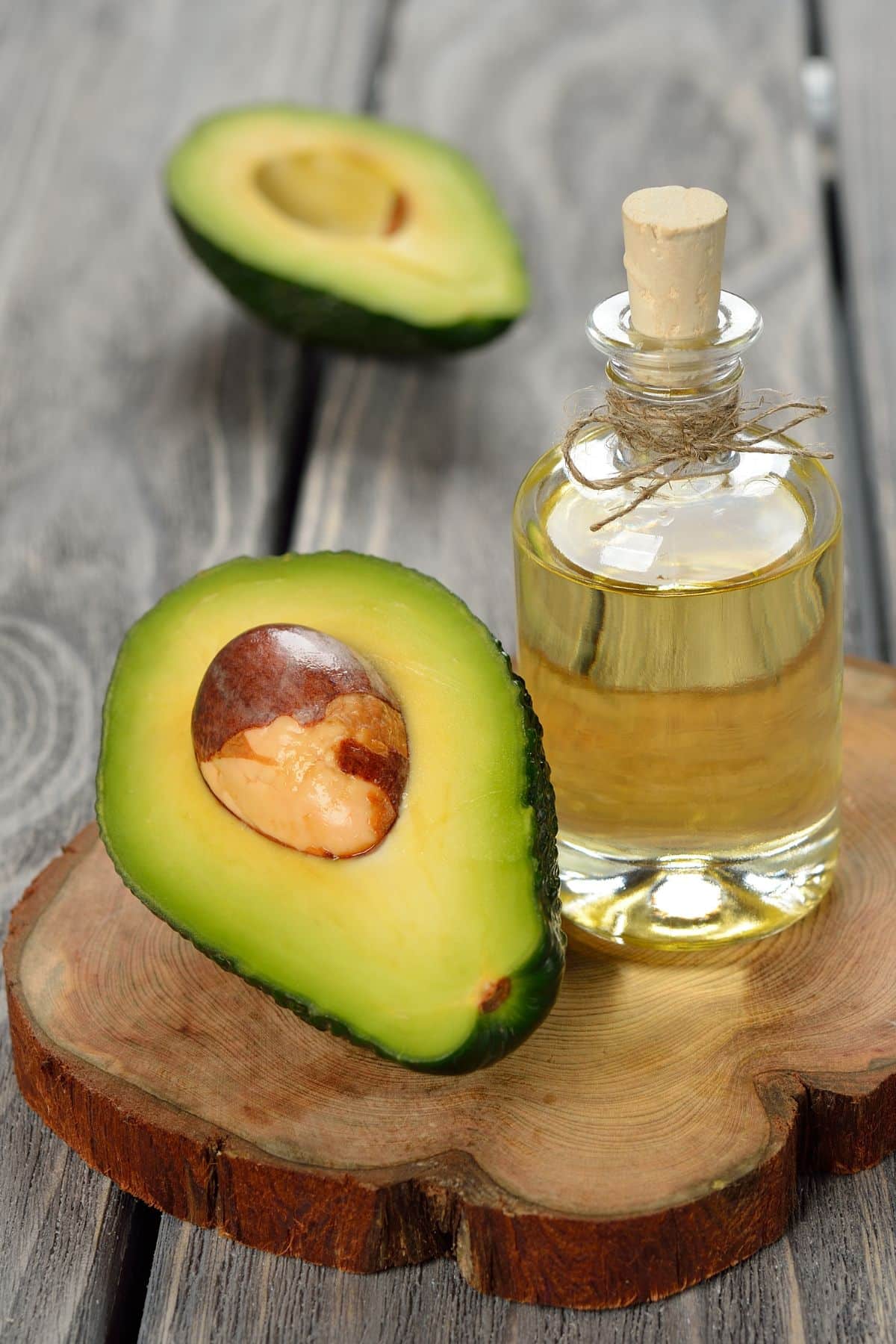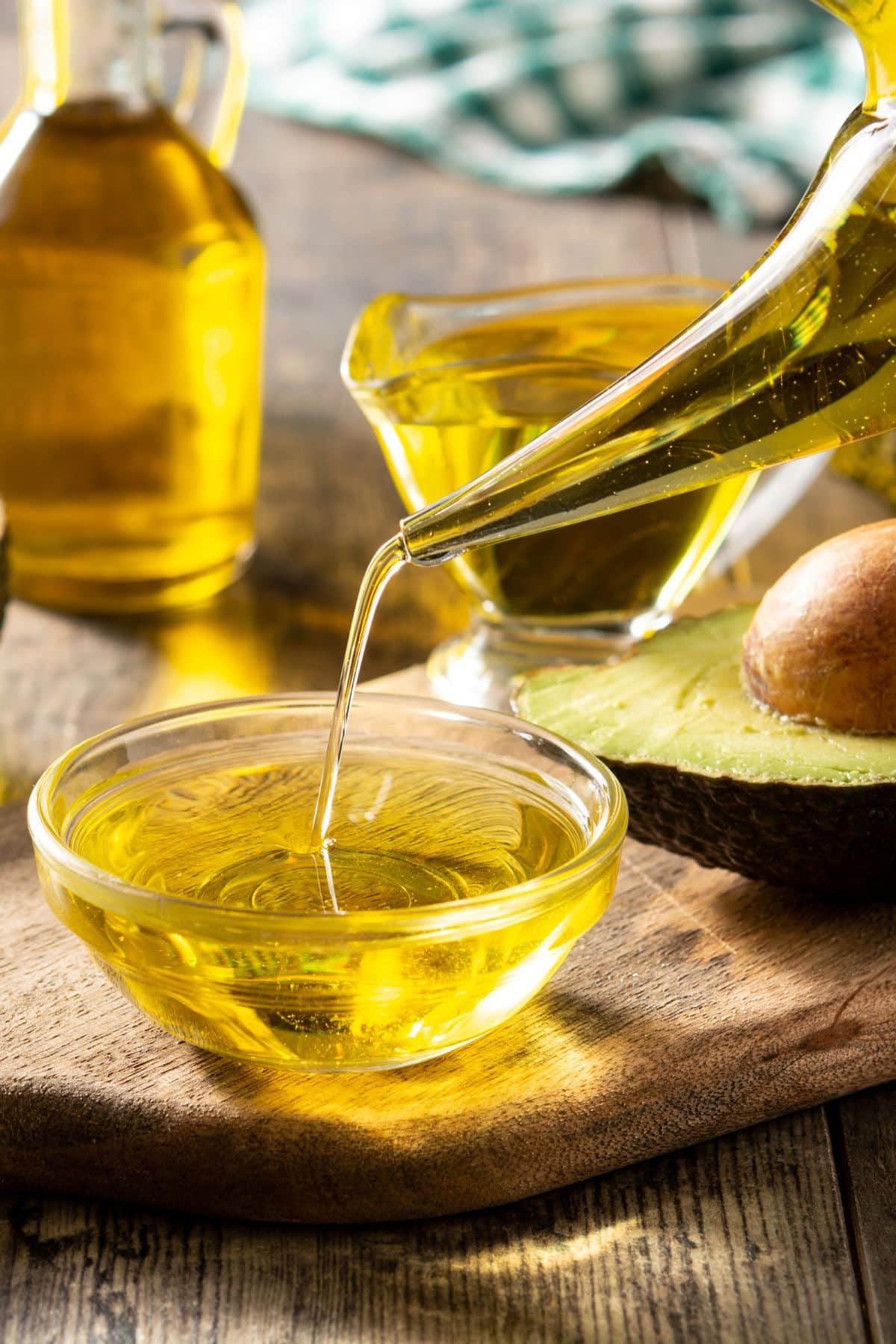Is Refined Avocado Oil Healthy (Nutrition Pros and Cons)?
In this blog post, I’ll review whether refined avocado oil is healthy or not? Find out what this product’s nutrition pros and cons are and if there are better options to consider.

Avocado Oil Facts
Avocado oil is extracted from the ripe and oily green or yellow flesh of the avocado fruit.
Even though avocado is a fruit, manufacturers classify this oil as vegetable oil – a term used for plant-based oils instead of animal-based oils like butter or lard.
Avocado trees are native to central and South America, where the humid, sub-tropical climate creates a perfect environment for the fruit to grow in. Luckily, you don’t have to vacation to Mexico to enjoy this healthy fruit; they also grow in warm regions in the United States and Africa.
The Hass avocado variety is one of the most popular varieties for oil extraction because the pulp of the avocado fruit has a high oil content and a delicious flavor profile. It is also one of the most delicious avocados to eat.
Although the skincare and cosmetics industry initially used avocado oil in their products because of its softening and soothing properties, it’s become popular as a culinary oil.
Chefs and home cooks worldwide use this flavorful oil for cooking and as a raw oil in healthy recipes.
Avocado oil has good heat stability and contains compounds with health benefits, including antioxidants, polyphenols, oleic acid, lutein, and vitamin E.
You can store this oil for as long as a year – as long as you keep it in a cool, dry place away from direct sunlight.

Refined Avocado Oil Vs. Unrefined Avocado Oil
If you found this article, you may wonder whether there’s a significant difference in nutrition between refined and unrefined avocado oil. Here’s a basic comparison.
Refined avocado oil
Refined avocado oil is filtered to remove any pulp. The process also removes the green color and tempers the flavor somewhat, making it milder.
Even though this avocado oil undergoes some processing, it’s still an excellent and healthy cooking oil and superior to vegetable oils.
One of refined avocado oil’s best attributes is its high smoke point of up to 500°F. This is a higher smoke point than many other oils which makes it appropriate for high heat cooking. Another attribute is that it doesn’t have an overwhelming “avocado” flavor.
For those who want the health benefits of this oil but prefer a milder taste, refined avocado oil is ideal.
To avoid harsh chemicals during the refinement process, choose refined avocado oils that have been “naturally refined.” I like Chosen Refined Avocado Oil!
Unrefined avocado oil
Avocado oil is one of the few edible oils not derived from the seed or pit of the fruit.
It means you can extract it using more natural methods like cold pressing. Without additional processing, this type of extraction results in unrefined avocado oil, which has an olive green or golden color and a robust and rich nutty flavor.
Because unrefined avocado oil has a lower smoke point than refined avocado oil, it’s best to use it raw in salad dressings, to drizzle on food, or for gentle cooking. Unrefined oils and extra virgin oils are more delicate than refined oils.
If you enjoy the taste of avocados, this oil’s bold flavor and exceptional health properties make unrefined avocado oil an excellent finishing oil.
You may notice a slight green tings to the unrefined version of cold-pressed avocado oil. You may also seen it marketed as extra virgin avocado oil.
Nutrition Pros
Nutritionally speaking, avocado oil is similar to olive oil.
Both of these healthy fats are high in unsaturated fats like monounsaturated and polyunsaturated fats. Including these “good fats” in your diet is a heart-healthy choice.
Avocado oil is also rich in antioxidants, polyphenols, oleic acid, lutein, and vitamin E. These healthy compounds have the following health benefits:
Lowers cholesterol
Avocado oil is rich in monounsaturated fat, which helps reduce LDL cholesterol while increasing HDL cholesterol.
Lowers blood pressure
Research has revealed that the oleic acid in avocado oil, and other healthy oils like olive oil, can help lower blood pressure naturally.

Improves heart health
When you reduce cholesterol and blood pressure, it contributes to heart health. But that’s not all.
Avocado oil may also help reverse the type of inflammation associated with the risk of heart disease and may also fight free radicals.
Improves hair, skin, and eye health
Avocado oil is rich in vitamin E and lutein – both important for hair, skin, and eye health.
Lutein is particularly good for eye health. It helps protect against age-related macular disease, which can cause vision impairment and blindness.
Reduces symptoms of osteoarthritis
The combination of avocado and soybean oil creates ASU, a highly regarded alternative anti-inflammatory treatment.
Studies have shown excellent results for people with osteoarthritis.
Nutrition Cons
Avocado oil is usually safe to consume.
If you are allergic to avocado fruit, you should also avoid the oil. In rare cases, people allergic to birch pollen or latex can also be allergic to avocados.
For people taking blood thinning medication Warfarin, also known as Coumadin, it’s best to avoid avocado oil. It may interfere with the effectiveness of the medication.
If you’re unsure, it’s best to consult your healthcare provider before including avocado oil in your diet.
Avocado Oil Nutrition FAQs
Yes, it is considered a healthy oil. The health benefits are similar to olive oil and they are both considered some of the best oils you can consume. See my list of cooking oils to avoid.
It can improve heart health, reduce cholesterol, and help you lose weight. Avocado oil is also excellent for hair, skin, and eye health and may even help reduce the symptoms of osteoarthritis.
Refined avocado oil has a high smoke point of up to 500 degrees fahrenheit, so it’s perfect for high-heat cooking.
For deep frying or cooking using high temperatures, you may wish to use refined avocado oil as opposed to unrefined avocado oil.
High-quality, naturally refined avocado oil does not contain harmful additives or chemicals.
However, some refined avocado oils rely on chemical bleaching and harsh solvents. When manufacturers use this method, very little nutritional value remains, and the end product may even contain toxic ingredients.
It’s best to use recommended, naturally refined avocado oil brands.
Recommended Refined Avocado Oil Brands
While refined avocado oil can be a healthier option over other oil selections, it depends on the quality of the oil you purchase. Here are some brands I recommend:
- Chosen Foods 100% Pure Avocado Oil
- Nutiva Organic Steam-Refined Avocado Oil
- Chosen Foods 100% Pure Avocado Oil Spray
Don’t Miss These Avocado Recipes
Summary
Avocado oil is a healthy oil with several potential health benefits. It may lower “bad” cholesterol and blood pressure, promote heart health, help with weight loss, and is excellent for hair, skin health, and eye health.
High-quality, naturally refined avocado oil is a perfect choice for high-heat cooking and for those who don’t like the flavor of avocado. Unrefined avocado oil is suitable for raw use and gentle cooking.
Don’t forget to join my newsletter list to get exclusive clean eating recipes and tips. The newsletter is 100% free with no spam; unsubscribe anytime.
About the Author: Carrie Forrest has a master’s degree in public health with a specialty in nutrition and is a certified holistic nutritionist. She is a top wellness and food blogger with over 5 million annual visitors to her site. Carrie has an incredible story of recovery from chronic illness and is passionate about helping other women transform their health. Send her a message through her contact form.
Note: this post is for informational purposes only and is not intended as medical advice. Please consult your healthcare provider for recommendations related to your individual situation.





















This article still doesn’t explain HOW the oil is refined. Chemicals, solvents, etc….?
Great question, I’ve updated the article. Choose “naturally refined” versions to avoid harsh chemicals.